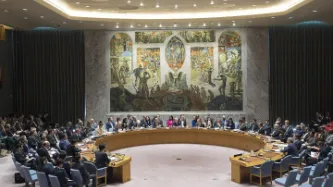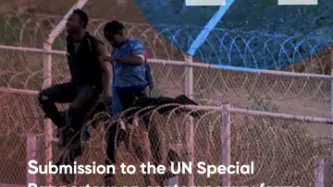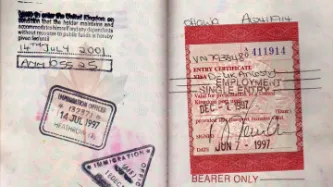Search
Content type: Long Read
All around the world people rely on state support in order to survive. From healthcare, to benefits for unemployment or disability or pensions, at any stage of life we may need to turn to the state for some help. And tech companies have realised there is a profit to be made.
This is why they have been selling a narrative that relying on technology can improve access to and delivery of social benefits. The issue is that governments have been buying it. This narrative comes along with a…
Content type: News & Analysis
In the last few weeks, the UK government has announced various new measures to ensure that crossings across the Channel were “inviable” including by appointing a new role of “clandestine Channel threat commander" and further plans to deploy the navy to stop migrants from crossing to the UK from France across the Channel. Premature plans it seems, as not only would such measures be contrary to the UK’s international obligations to allow individuals to seek asylum in the UK, but also since such…
Content type: Explainer
At first glance, infrared temperature checks would appear to provide much-needed reassurance for people concerned about their own health, as well as that of loved ones and colleagues, as the lockdown is lifted. More people are beginning to travel, and are re-entering offices, airports, and other contained public and private spaces. Thermal imaging cameras are presented as an effective way to detect if someone has one of the symptoms of the coronavirus - a temperature.
However, there is little…
Content type: News & Analysis
The UN Special Rapporteur on the promotion and protection of human rights and fundamental freedoms while countering terrorism, Professor Fionnuala Ní Aoláin together with Dr. Krisztina Huszti-Orbán, released today a key report on the “Use of Biometric Data to Identify Terrorists: Best Practice or Risky Business?”.
The report explores the human rights risks involved in the deployment of biometrics emphasising that
in the absence of robust rights protections which are institutionally embedded…
Content type: Key Resources
Content type: Long Read
Over the last two decades we have seen an array of digital technologies being deployed in the context of border controls and immigration enforcement, with surveillance practices and data-driven immigration policies routinely leading to discriminatory treatment of people and undermining peoples’ dignity.And yet this is happening with little public scrutiny, often in a regulatory or legal void and without understanding and consideration to the impact on migrant communities at the border and…
Content type: Case Study
Chinese artist Ai Weiwei creates art that highlights the harmful effects of surveillance on society — and is himself a target of persistent surveillance by the Chinese government. In an article for Agence France-Presse, he said, "In my life, there is so much surveillance and monitoring -- my phone, my computer ... Our office has been searched, I have been searched, every day I am being followed, there are surveillance cameras in front of my house.”
Weiwei is an artist, blogger, documentary…
Content type: Advocacy
Privacy International (PI), Fundaciòn Datos Protegidos, Red en Defensa de los Derechos Digitales (R3D) and Statewatch responded to the call for submission of the UN Special Rapporteur on contemporary forms of racism, xenophobia and related intolerance on how digital technologies deployed in the context of border enforcement and administration reproduce, reinforce, and compound racial discrimination.
This submission provides information on specific digital technologies in service of border…
Content type: News & Analysis
For the past few weeks, people across the world, starting in the US, have taken to the streets to protest the murder of George Floyd, a victim of police brutality. The protests, which are organised by and in support of the Black Lives Matter movement have also become a platform to protest against state sponsored violence and systematic racism against black people.
The majority of articles and media focus have so far focused on what happens during the protest, namely an increasingly militarised…
Content type: News & Analysis
Yesterday, Amazon announced that they will be putting a one-year suspension on sales of its facial recognition software Rekognition to law enforcement. While Amazon’s move should be welcomed as a step towards sanctioning company opportunism at the expense of our fundamental freedoms, there is still a lot to be done.
The announcement speaks of just a one-year ban. What is Amazon exactly expecting to change within that one year? Is one year enough to make the technology to not discriminate…
Content type: News & Analysis
Humanitarian organisations are defined by their commitment to core, apolitical principles, including: humanity, impartiality, neutrality, independence and to “do no harm”.
And yet the ways data and technology are being used in the world today are often far from being apolitical, humane, impartial, neutral and independent, and in many instances many actors are using technology to exploit people, failing to protect and empower many individuals and communities - in particular those most in need…
Content type: Advocacy
Last week, Privacy International joined more than 30 UK charities in a letter addressed to the British Prime Minister Boris Johnson, following his recent declaration, asking him to lift No Recourse to Public Funds (NRPF) restrictions.
Since 2012, a ‘NRPF condition’ has been imposed on all migrants granted the legal right to live and work in the UK. They are required to pay taxes, but they are not permitted to access the public safety net funded by those taxes.
This is not a topic we are known…
Content type: Case Study
As working from home is becoming the new normal, employees’ monitoring becomes the new norm.
Companies around the globe are increasingly using software to monitor how long we spend in front of our computer, what websites we visit and what apps we use, when we type, for how long and how fast, how long our mouse stay inactive — any more than 15 seconds away can shift us from ‘active’ to ‘idle’ — and require us to keep our camera and microphone on at all times. These systems pit us against our…
Content type: Long Read
It is common for families with no recourse to public funds who attempt to access support from local authorities to have their social media monitored as part of a ‘Child in Need’ assessment.
This practice appears to be part of a proactive strategy on the part of local authorities to discredit vulnerable families in order to refuse support. In our experience, information on social media accounts is often wildly misinterpreted by local authorities who make serious and unfounded allegations…
Content type: Explainer
Social media platforms are a vast trove of information about individuals, including their personal preferences, political and religious views, physical and mental health and the identity of their friends and families.
Social media monitoring, or social media intelligence (also defined as SOCMINT), refers to the techniques and technologies that allow the monitoring and gathering of information on social media platforms such as Facebook and Twitter which provides valuable intelligence to others…
Content type: Case Study
You have the right to decent standards and dignity at work, and the right to join a union to protect yourself and your rights. That might come as a shock to Amazon - who have been using Covid-19 as a reason to undermine those rights.
Chris Smalls, an organiser and now former Amazon warehouse assistant manager, led a walkout at a New York City facility and within days he’d been fired under a dubious pretext.
The walkout was to ensure workers’ safety - they were asking for the warehouse to be…
Content type: Examples
At least four law enforcement agencies in the US - two in California, and one in each of Maryland and Texas - are using drones to communicate with homeless people about maintaining social distance because encampments are located in areas that are difficult to access and police do not have to visit in person. Critics complain that the move increases encampment dwellers' already-high distrust in government. Many of the drones are being donated by the China-based drone company DJI as part of the…
Content type: Advocacy
To the Members of the European Parliament and to the Committee on Budgets of the European Parliament
The EU urgently needs to step up and provide assistance to protect the health and safety of people trapped in camps on the Greek islands - not just to protect their welfare, but to contain the virus itself as a matter of global public health.
However, as we detail in the briefing below, the current European Commission proposal for funds allocation is insufficient to ensure the safety of…
Content type: News & Analysis
Lockdowns and quarantines are an extraordinary measure that help in slowing down the global COVID-19 pandemic, and protecting the population.
However, they come at an even higher cost to some individuals, such as victims of domestic violence, persons in a vulnerable situation, and human rights defenders, who face specific threats that are exacerbated by measures taken by governments to address the global pandemic.
In that context, states should adopt special measures to keep those people…
Content type: News & Analysis
Amid calls from international organisations and civil society urging for measures to protect the migrant populations in Greece and elsewhere, last week, the European Commission submitted a draft proposal to amend the general budget 2020 in order to, among other measures, provide assistance to Greece in the context of the COVID-19 outbreak.
Both at the Turkish-Greek border and in the camps on the Greek islands, there are severe concerns not only about the dire situation in which these people…
Content type: Case Study
In Peru, you get asked for your fingerprint and your ID constantly - when you’re getting a new phone line installed or depositing money in your bank account – and every Peruvian person has an ID card, and is included in the National Registry of Identity – a huge database designed to prove that everyone is who they say they are. After all, you can change your name, but not your fingerprint.
However, in 2019 the National Police of Peru uncovered a criminal operation that was doing just that:…
Content type: Case Study
There are 29.4 million refugees and asylum seekers across the globe today. These are people who have fled their countries due to conflict, violence or persecution seeking protection in safer environments.
People have protected those in need fleeing from dire situations since antiquity. However, over recent years, European countries have become increasingly hostile towards refugees - treating them as criminals instead of people in need.
In 2017, German authorities passed a…
Content type: Case Study
The increasing deployment of highly intrusive technologies in public and private spaces such as facial recognition technologies (FRT) threaten to impair our freedom of movement. These systems track and monitor millions of people without any regulation or oversight.
Tens of thousands of people pass through the Kings Cross Estate in London every day. Since 2015, Argent - the group that runs the Kings Cross Estate - were using FRT to track all of those people.
Police authorities rushed in secret…
Content type: Case Study
In 2015, James Bates was charged with first-degree murder in the death of Victor Collins. Collins was found floating face down in Bates’ hot tub in November 2015. Bentonville police served two search warrants ordering Amazon to turn over the “electronic data in the form of audio recordings, transcribed records, text records and other data contained on the Amazon Echo device” in Bates’ home.
The reason for the warrants? According to the police, just because the device was in the house that…
Content type: News & Analysis
Today, the District Court of the Hague ruled that the right to privacy prevailed over the hunt against alleged benefits fraudsters. The ruling could have huge implications for the future of digital welfare around the world.
In NJCM cs/ De Staat der Nederlanden (NJCM vs the Netherlands), also known as the SyRI case, the court considered the legality of the System Risk Indication (SyRI), a system designed by the Dutch government to process large amounts of data collected by various Dutch public…
Content type: News & Analysis
In mid-2019, MI5 admitted, during a case brought by Liberty, that personal data was being held in “ungoverned spaces”. Much about these ‘ungoverned spaces’, and how they would effectively be “governed” in the future, remained unclear. At the moment, they are understood to be a ‘technical environment’ where personal data of unknown numbers of individuals was being ‘handled’. The use of ‘technical environment’ suggests something more than simply a compilation of a few datasets or databases.
The…
Content type: News & Analysis
On 30 January 2020, Kenya’s High Court handed down its judgment on the validity of the implementation of the National Integrated Identity Management System (NIIMS), known as the Huduma Namba. Privacy International submitted an expert witness testimony in the case. We await the final text of the judgment, but the summaries presented by the judges in Court outline the key findings of the Court. Whilst there is much there that is disappointing, the Court found that the implementation of NIIMS…
Content type: News & Analysis
Today Advocate General (AG) Campos Sánchez-Bordona of the Court of Justice of the European Union (CJEU), issued his opinions (C-623/17, C-511/18 and C-512/18 and C-520/18) on how he believes the Court should rule on vital questions relating to the conditions under which security and intelligence agencies in the UK, France and Belgium could have access to communications data retained by telecommunications providers.
The AG addressed two major questions:
(1) When states seek to impose…

























